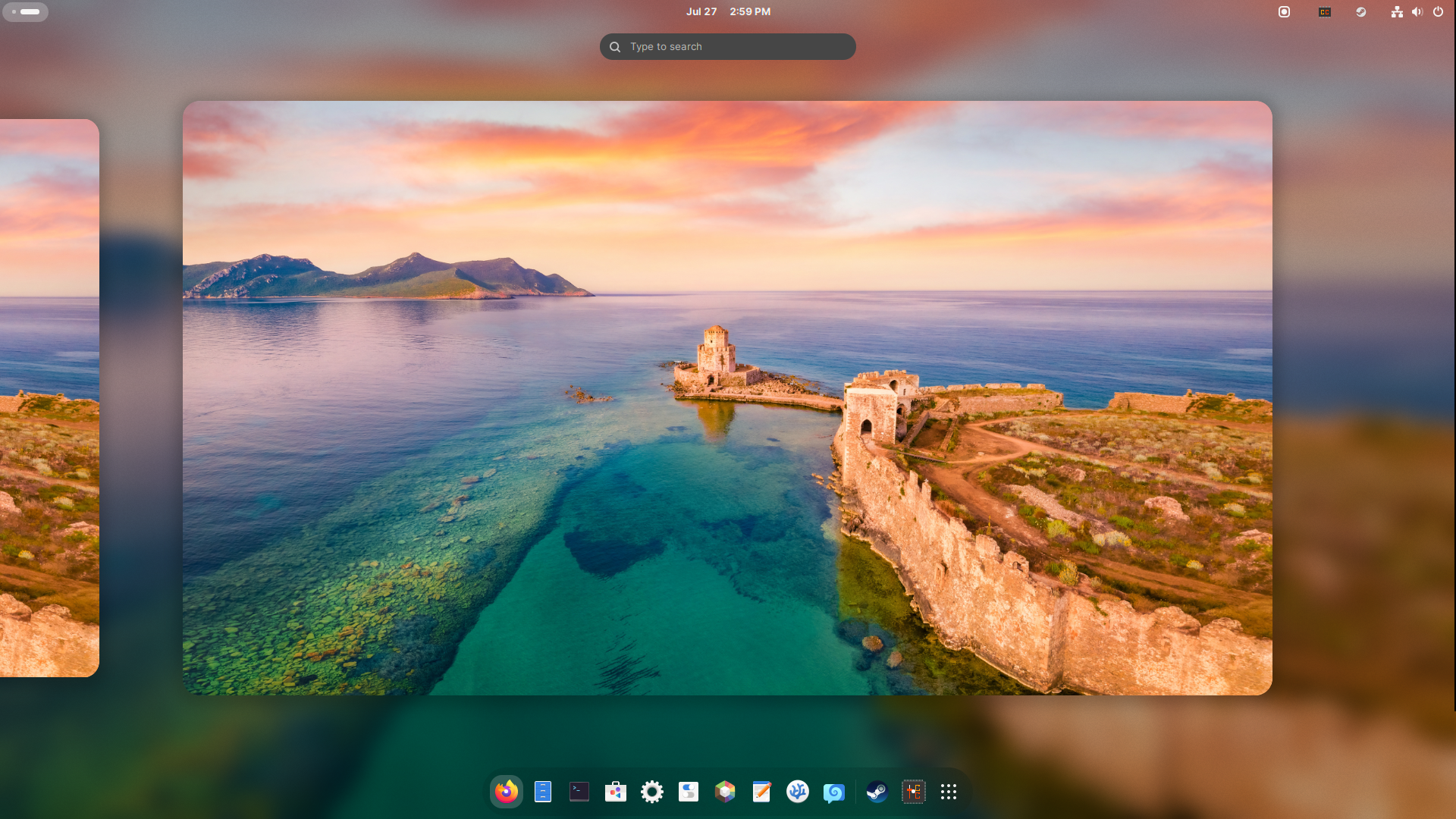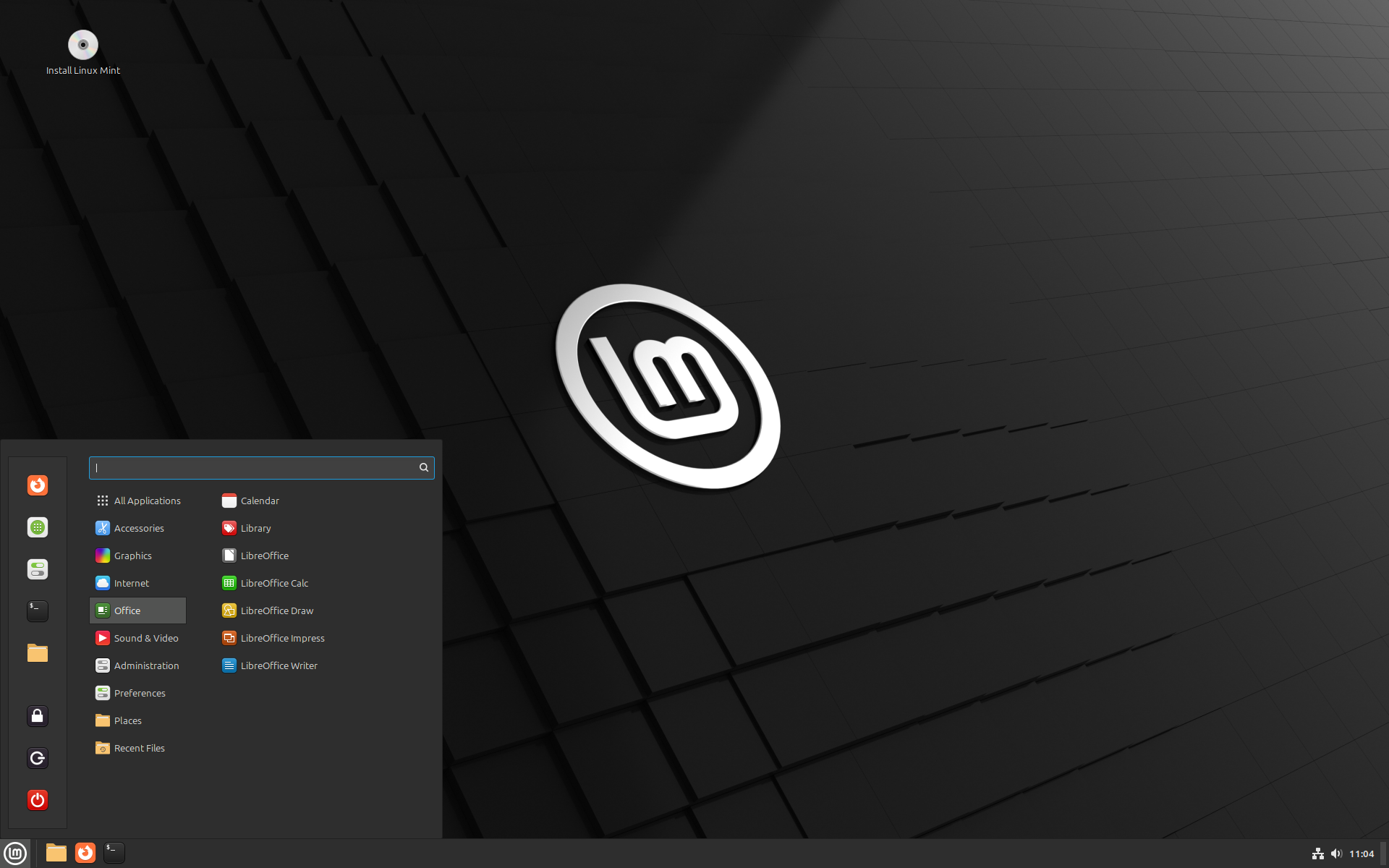The Linux Mint team has just released Linux Mint 22, a new major version of the free Linux distribution. With Windows 10’s end of support coming up quickly next year, at least some users may consider making the switch to Linux.
While there are other options, paying Microsoft for extended support or upgrading to Windows 11, these options are not available for all users or desirable.
Linux Mint 22 is a long-term service release. Means, it is supported until 2029. Unlike Microsoft, which made drastic changes to the system requirements of Windows 11 to lock out millions of devices from upgrading to the new version, Linux Mint will continue to work on older hardware, even after 2029.
Here are the core changes in Linux Mint 22:
- Based on the new Ubuntu 24.04 package base.
- Kernel version is 6.8.
- Software Manager loads faster and has improved multi-threading.
- Unverified Flatpaks are disabled by default.
- Preinstalled Matrix Web App for using chat networks.
- Improved language support removes any language not selected by the user after installation to save disk space.
- Several under-the-hood changes that update libraries or software.
My main issue with mint has always been the reluctance to use a newer package base. Fortunately I think that’s changing since they’re adopting Wayland support and have their edge iso now. Currently running bazzite and it’s pretty rock solid with a couple quirks, but I’ve always thought about going back to mint when they start updating their package base.
Mint is my daily use OS at work, and will soon be taking over my windows machine at home that acts as a server.
I’m sure it’s a side effect of me being old and being busy all the damn time, but I love that it can literally be easier to install and use than windows, without losing any linux-ness. Big deal if it looks like I have a windows taskbar, I still have my screens taken up by Firefox, VSCode, terminal.
After my old notebook died, I bought a $200 old, but refurbished, ThinkPad from NewEgg, put Mint on it, and I’m quite satisfied.
I just did the upgrade this morning. Shocker: super easy, went seamlessly, and didn’t make my computer unusable for a chunk of time like big windows updates do.
I tried Linux Mint for like a day or two when I left Windows, but then I tried Kubuntu and after that I didn’t have a need to try anything else
I’ve tried dozens over the years and I keep finding myself going back to kubuntu. It just works
that’s generally how it works with Mint. you install it, use it for a week or two and then move onto a distro that better suites your needs. Mint is a fantastic introduction and sure many will stick with it for awhile I think most move on from it fairly quickly.
“most move on”?
Source? because I believe it’s quite the opposite.
sorry I’m new to Linux but most of the people I’ve spoken to on various linux discords the consensus seemed to be that Mint was fantastic to start out on but most moved on to something else after awhile.
most of the people I’ve spoken to on various linux discords
Might have a teensy sample selection problem there haha
I have not moved on. I think most Linux distros would suit most people’s needs and I think a lot of Linux users greatly overestimate what the average person does with a computer, which mostly involves staying within a web browser. That’s why Chromebooks are still a thing. A cheap web browser is all a lot of people need. So if you get them to switch to Mint (or any distro), they don’t really have much of a reason to switch.
I’m not a big gamer, I’m not a coder, I’m just someone who wants a working web browser, an office suite and a way to play audio and video. Anything else is a bonus but not something I really need in a notebook. So Mint is fine for me.
I’ve installed Mint on pretty much any old machine I can get my hands on. Right now I’m using it with KDE as my daily driver and couldn’t be happier.
I’d say for most people coming from windows, there’s little in the way of expected functionality that would be included in other distros.
- signed, a Mint simp
It’s all about finding the distro that works for you. Don’t let anyone tell you otherwise.
Thank you. That was what really pissed me off when I finally switched to Linux. Suddenly it went from OS wars to sub-OS wars.
Like the first day I installed Mint I asked a question and some guy told me that Mint sucked and I should use some other distro. You’ve all been trying to get people to switch to Linux for years and now you give them shit when they are using a distro you don’t like? The fuck?
Those people are stupid. The entire point of having so many limits distros is so that every use case is covered. I’ve used Ubuntu, Mint, Fedora, Arch, Void, even dabbled in Gentoo, and I can tell you that there’s a valid reason to use pretty much all of them, and also valid reasons not to use any particular one of them. “You do you” should be the dogma of the Linux community, not “You do me.”
The Linux community really lives up to the meme sometimes.
Still waiting for someone to say “I use Arch btw”
I DON’T use Arch, btw. But I might accept the challenge of trying to install it one day, seems like a fun way to learn how Linux actually works.
Arch is a bitch and a half to install on anything because it doesn’t come with anything. You want network drivers? Fucking install them yourself, asshole, Arch don’t do fuck all without being commanded to.
As a result, the only thing Arch actually does come prepackaged with is the sense of smug superiority you get upon completing a build with it.
Mint is so user friendly
Okay so as someone who’s getting fed up with Windows and Microsoft as a whole, I’m interested in Linux.
I just wanna game and watch videos. Video calls n such with friends. Nothing too spectacular.
Now can someone who doesn’t work on computers for a living, or even isn’t a hobbyist programmer. Someone like me, who couldn’t write a line of code on their own, answer me how difficult would it actually be?
My biggest fear is that I’m convinced by all the tech nerds here who can of course run this no problem and don’t see why a beginner would struggle, and then my anxiety shoots through the roof while I have a breakdown because I just wanted to get home from work and relax and suddenly my PC is a paperweight.
Dead easy with Mint. I’ve been running it full time on my laptop for months now and my wife only recently came to find out it wasn’t windows when I was explaining Linux to her (and she’s not a technical personal - she’s the person who yells at TV remotes when they don’t work). Installation is super easy, much like installing windows - answer a few questions and off it goes. You can even install it alongside windows and pick what one you want to run on boot (I did this because of a couple windows-only apps I can’t ditch just yet). If you can figure out Lemmy, Mint will be a breeze too.
Do you sacrifice anything performance-wise by having the dual-boot?
After not even two years my beast pc I have for work has started giving me BSODs, apps crash, etc. Tried a bunch of stuff to troubleshoot hardware side, software side, short of buying new expensive parts like ram etc to test, or reinstalling the OS.
I do mostly video editing, sound editing, and Photoshop+Lightroom mainly, with some 3D, vector and stuff like that here and there. I think most of my software runs on Linux except the Adobe stuff. I’m curious to try Linux see if it would solve some of the problems but afraid that even the dual booting stuff would still be a pain if I need to switch between PS+LR to other tools a lot.
The other reply answered your performance question already, but to address your concern about switching between OS’s for different program needs - you could always run windows in a virtual machine on Linux and just use Windows and the needed Windows software that way without having to fully reboot into Windows. This is the direction I plan on eventually going someday with my own setup and using Tiny11 for a lightweight windows VM.
I’m gonna give it a go after this current job is delivered!
no perf. loss with dualbooting, just takes more space.
Oh, neat, I installed Mint on my home machine literally 3 days ago without knowing Mint 22 was coming. Time to upgrade lmao
Removed by mod
Can you recommend a bot that will contact that number incessantly?
I recently gave thr debian based Linux Mint a try and I was pleasantly surprised.
I might ditch ubuntu for this.
Just curious, if you’re already using Ubuntu why try LMDE rather than the default version?
The default version of what?
Of Linux mint. The Cinnamon edition that pulls a lot from Ubuntu as well as Debian. That’s what got upgraded to version 22, along with the could other flavors. But Linux Mint Debian Edition (LMDE) does not follow the same versions & release schedule.
Oh, like that.
Well, mainly because I’m getting a little fed up with how Ubuntu forces snap on to you. I just want to install the apt versions of programs but it won’t do that out of the box.
And I know you can change that and remove snap but I am a little done with always having to mod the shit out of my linux installations to get them to work the way I like.
Other than that I am pretty satisfied with how Ubuntu works out of the box and has pretty good hardware support. I was basically looking fot an Ubuntu without snap.
Ubuntu without snap is exactly what Mint Cinnamon is! You get to lean on all those popular Ubuntu resources and use apt and all that good shit.
It is? I did not know that! Thank you very much for enlightening me! I’ll be giving that a try now.
Glad to help! They do include flatpak stuff in the software manager if you use that, but they are marked as such.
I checked this morning and I have no flatpaks installed and snap/snapd itself isn’t even installed on my system.
Mint’s ok other than that ubun taint Years ago it was a one man show, not as much now?
I came & went from Mint 2010, I don’t remember specifics, something about network sharesMy criteria is corporate or community?
Tinker or work?
Bleeding edge or just works
KDE/qt or Gnome/gtk, there are a few DE’s forked from Gnome
I like the consistency across KDE apps of being able to have a custom toolbar & shortcutsI like community built, user friendly, KDE
Whatever you choose, install the meta package. You can add a DE, but you will have to chase weird crap & it will never be as good as a clean install
I like to install whatever I want to test on usb3 external nvme/sdd/hdd & use the Home [files] on the main machine or copy home as backup, best way to get the full effect of any distro
Just to be safe I like to have stuff from different parts of the linux world as backupsDebian MX just works, been good since they got over their init fixation, got all sorts of user friendly stuff, 6 month release cycle, enough community to keep it working
I just downloaded Spiral linux all the nice touches, but updates direct from debian, kind of like the various arch installers, but not quite so do it yourself
I don’t really like synaptic, the text is too small, takes too longArch
Manjaro
As much arch as you want
Very user friendly, big community, Pamac [best package manager], rolling releaseRed hat Suze is having weirdness from corporate again
I’m on Mageia, a long history of user friendly [drak tools], stable, just works
Very good community, 18 month release cycle, nice online version upgrade, rpm packagesLinux Mint is just great :)
Agreed. I managed to get my grandpa onto Linux using Mint on his old computer. He said the interface resembled classic Windows and was up and running in less than five minutes. I just had to show him how to use the software manager and that’s it.
I got my aunt’s laptop on Mint. Was unusable with Win 10, like click the start button, wait 4 minutes and then the start menu opens. Took right to it, especially since she’s been using an Android tablet for just about everything so she knew what an app store was. “Linux calls it a software manager” was all the training required.
It’s also got so many features that just make sense, like extending to separate monitors being automated, or when you download multiple files they’re automatically zipped to conserve space.
I did love Mint.
Linux Mint was my gateway drug to linux. It’s simple and powerful! Now I’m a happy KDE user, but you never forget the first love
I’m really inexperienced with Linux but I’ve become interested since getting a steamdeck which uses KDE for its desktop, which I’ve enjoyed—so how do KDE and mint compare?
KDE: traditional desktop environment with focus on lots of customization, options, and features. Often aimed more towards enthusiasts or everyday users who want the latest features.
GNOME: non-traditional desktop focusing on simplicity. Designed to be used a very specific way to maximize productivity. Often aimed more towards corporate or professional users.
Mint uses their own desktop environment (cinnamon) which is somewhere between the two.
All of these are nice in their own way, you just need to find which one you like best!
I use Plasma on Mint. Love my setup
I ran a dual-boot for a month and a half when news about Windows Recall broke, but unfortunately, my Nvidia setup experienced a lot of bugs and proved to just be too incompatible.
So, when I upgrade to a new computer later this year, I’m going to make this machine a Linux-only machine with a different distro, and then have my other PC for all my gaming needs.
You probably needed to download some drivers for your gpu
I tried several.
None of them functioned well, and over that period of time it became clear it was a system issue. But, I know there are other distros that are more Nvidia-friendly, and when the time comes, I’ll use one of those.
Thankfully there’s O&O ShutUp to turn off Windows tracking for now.
Plasma is quite nice now.
It really is. I don’t get the love for the tabletish gnome interface everyone is using.
I get why some people like it, for sure. I’m just surprised so many “power users” seem to.
Power users probably just use hotkeys and type, Gnome is attractive and stays out of your way. That said - I like Plasma, too. That’s the fun of Linux, it’s so customisable to each person’s needs.
KDE has continually felt less solid to me when I’ve used it, and the reviews I’ve seen of it seem to note that is still the case.
Less solid how? I use it everyday and don’t really notice any problems
Yeah, it’s fantastic. I don’t know how I spent so much time in gnome before finding KDE, I can’t imagine going back. I guess there could be something better out there, I’d love to know about it if there is.
Gnome is just perfect for laptops and convertibles. I can quickly navigate it using the touchpad and super key. It also has better touch screen support, and with one extension (hide top bar), literally all of the screen real estate is available for your work. Hit the super key or 3-finger-swipe up and the UI appears. 3-finger-swipe sideways to switch to another virtual desktop. All my programs are full-screen and on their own desktop. The animations are so smooth, it’s a joy to use.
And the Gnome apps are just simple and reduced to what you actually need.On a desktop PC I prefer Plasma for its customizability and smaller UI elements. It’s better for navigating with a mouse (although you can also turn it into a Gnome-clone or a tiling WM just with built-in options). And the KDE apps feel more “professional”, with lots of additional functionality, options and settings.
What distro are you running with plasma? I’ve had issues with instability on KDE neon, so I’m planning to switch to a different distro. Plasma is still nice, so I’m looking for inspiration for what to mix and match.
Kubuntu is what I use
OpenSUSE Tumbleweed.
It has a unique workflow which clicks for people like me, even if they’re on a desktop. It encourages workspaces by making creating and switching between them instant and seamless, and i like seeing all of my windows at once by just pressing the super key.

With Overview you can get something very similar in Plasma, though you’d need to change the default shortcut to open it by just pressing the super key.
However it’s not as quick, and it’s not considered the main method of navigating your windows. AFAIK you can’t switch workspaces by scrolling there or have your apps list visible.
Oh I love your wallpaper, do you have a link to somewhere I can download it?
Sure, I use an extension to get daily wallpapers, but here’s the image for that day:

I researched this a few years ago, but is their a way to get SolidWorks, SpaceClaim etc working on Linux? Or do I have to run a virtual machine with windows?
I was not successful running Solidworks under Linux and it even detects when it is running in a virtual machine and refuses to install completely!
Finally I have found an alternative that suits my needs, that has free account for hobby purposes: on-shape.com it’s web-based, works flawlessly under Linux and Firefox. Workflow is very similar to Solidworks, and version-control is simple and nice.
Doesn’t onshape originate from a bunch of SW engineers so that’d make sense!
Personally, I was paying for SW with a maker license but this year I’ve committed to Freecad, use realthunder’s fork that has the topo naming fix + modern ui workbench for a more familiar layout.
I would call it totally useable, workflow for me ends up the same or similar to solidworks, I tried fusion because that’s really popular but it didn’t click with me while freecad did. I won’t pretend it’s flawless and doesn’t have quirks but I’m willing to accept that for foss, need to spend a bit of time with it to get used to what it expects you to do but it’s really powerful once you do.
Some people have run solidworks on Linux with limited success. Granted I have never personally done it, from what I understand they used wine which emulates windows anyway. So it depends on how much time you are willing to sink to get things working.
Not to be critical of your input but wine is not an emulator (which is wine’s acronym), it’s actually a translation layer that converts windows calls into Linux on the fly, which can be a lot faster than emulating windows. Add to the original person’s question a quick Google led me to this project
Switching to Linux is almost always going to involve accepting that you may need to use alternative software compared to what you’re used to. If that’s unacceptable and you have mission critical work that can only be done on Windows compatible software, you may be better off staying put.
I switched to Mint for my new PC a few months ago. There are a handful of games that don’t work on it, but they’re few and far between.




















